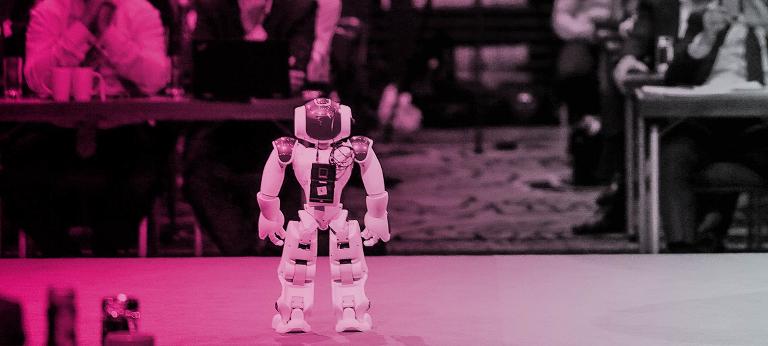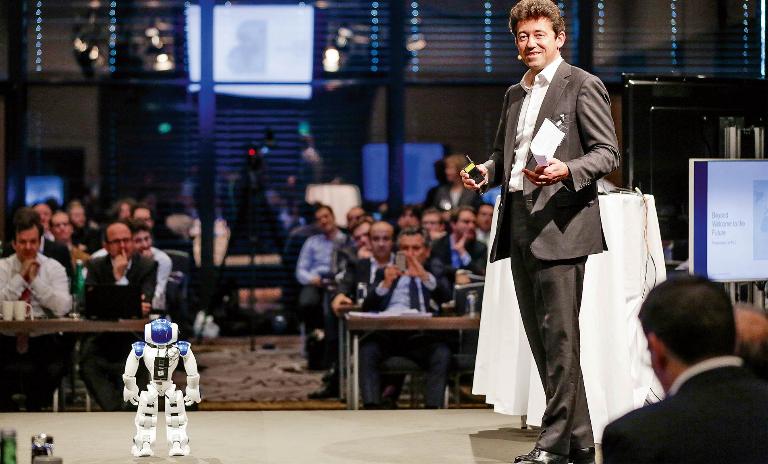AI think, therefore AI am
![{[downloads[language].preview]}](https://www.rolandberger.com/publications/publication_image/think_act_magazines_artificial_intelligence_roland_berger_cover_download_preview.jpg)
What exactly do people mean when they talk about AI in 2018? Where do I start if I want to embrace AI in my business? Get your questions answered in our Think:Act magazine on artificial intelligence.



by Charles-Edouard Bouée
January 2000. That's when I met Kenny Hirschhorn in London. I was working on the France Telecom-Orange merger. Kenny headed strategy for Orange. His title made him truly special: group director of strategy, imagineering and futurology. After exchanging pleasantries, he pulled out his phone and said, "You're a strategy consultant. What is this?"
"A mobile phone," I said. Kenny sighed. "I'll give you another chance." I took another stab: "Nokia." Kenny shook his head in disappointment. "This is the remote control of your life." He showed me a video of an executive in California getting in his car, whipping out his phone and checking his appointments. Then he viewed his wife's ultrasound images emailed by a nurse. My jaw dropped. For me, this was an Arthur C. Clarke-style fantasy.
Fast forward to 2017 and we are on the cusp of an artificial intelligence (AI) revolution. It will impact the economy, industry and society. Business leaders know that AI will have far-reaching consequences, but somehow AI is still too far off for them. But the future is hurtling toward us and soon AI will be unavoidable. It will transform business and our lives. The AI revolution will happen when millions have access to it, the same way electricity transformed people's lives a century ago. It will revolutionize how we live, work, communicate and travel. I believe this revolution will happen within the next decade.
But how? Back to Kenny. Some of his vision is already playing out with how we use smartphones today. We have all talked nonsense to Siri, the iPhone personal assistant, to hear how it responds. But Siri is really a voice command app tending to our requests and belongs to the "gadget" category.
This is where Kenny planted the seed of an idea for me 17 years ago. The AI revolution will be powered by what I call "portable artificial intelligence." It can be defined as an extension of the self. Everyone will have "their own" personal AI: in a box in the living room, in a smartphone or even embedded in a chip pinned to your lapel.

Portable AI will simplify our lives in unimaginable ways. It will be enough for us to wish to take a vacation and our portable AI will do the rest: sync our calendars with those of our close ones, anticipate the dates of our kids' school holidays, choose a date and a destination based on our likes and then book the vacation package in the blink of an eye. The AI software, which could be provided by a mobile operator, for instance, will use a private cloud and will have no advertising. And so, we won't be reluctant to let it access our personal data.
As a result, our AI will rapidly build a deep understanding of who we are, enabling it to provide hyper-personalized services and give us greater satisfaction. Today, we reluctantly give bits of information to many service providers, but each of them knows very little about us. Tomorrow our private cloud-based AI will centralize all relevant information and orient us toward things we want.
The ingredients are all in place to create a portable AI revolution: a massive influx of capital, increased convergence between the work of researchers and the fantasies of entrepreneurs, an exponential increase in machine power and the miniaturization of electronic components.
The advent of portable AI will impact many sectors. Take advertising. What is the use of bombarding us with advertisements if our AI software knows what we want, is able to find it on its own and is equipped with a blocking algorithm for unsolicited commercial advertising? The act of buying is transformed. If our personal AI can order our breakfast cereal – exactly how we like it – and have it produced and delivered to us, what is the role of brands, stores and packaging?
The question that business leaders must ask is: What are the products and services we need to create for a world where everyone has their own portable AI? The winners will be those who do this forecasting exercise. The good news is that, as with every wave of technological innovation, the cards will be reshuffled. One is tempted to believe that large digital platforms like Google, Apple, Facebook and Amazon (GAFA) will dominate the market for portable AI. The massive investments they make in AI could convince us of that (after all, Google paid $400 million for DeepMind in 2014!).
On the contrary, I believe that AI, particularly portable AI, could end the monopoly the GAFAs have. First, because the huge amount of data produced makes data obsolete faster. Every two years almost as much data is produced as humanity has produced in the course of history. But not all companies have the same quality of information. What we liked on Facebook a year ago may no longer be relevant. So accumulated data capital will soon no longer be a decisive advantage. It is much more essential to capture active users, here and now. We'll shift from a situation where multiple users all go to the same platform or service provider to one where every user is equipped to look for and find exactly the products and services they need, wherever they are. The balance of power between the large firms and users will shift.
Portable AI solutions could succeed because they will give us what the advertising-reliant GAFAs can't: protection of personal data, personalized services and trust. Today's digital monopolies are unlikely to win this battle because they would need to kill their business model to do it.
This brings me to the "Hirschhorn Theory," which I named after Kenny. If someone at Orange had paid more attention to his idea of "the remote control of your life," Orange might have invented the smartphone before Apple. But they didn't. To own the future, we need to think beyond current business models and realities, and try to imagine what life could look like tomorrow.
Embedded AI solutions are already being developed outside of the big digital giants in companies like Sentient in the US, Arago in Germany, SenseTime in China, Snips in France or Element AI in Canada. The question is: When will these different AI "bricks" in different areas of our lives connect with each other to take charge of all the questions we ask ourselves every day? And who will come up with a relevant business model? The race for the next $1 trillion company is open!

![{[downloads[language].preview]}](https://www.rolandberger.com/publications/publication_image/think_act_magazines_artificial_intelligence_roland_berger_cover_download_preview.jpg)
What exactly do people mean when they talk about AI in 2018? Where do I start if I want to embrace AI in my business? Get your questions answered in our Think:Act magazine on artificial intelligence.
Curious about the contents of our newest Think:Act magazine? Receive your very own copy by signing up now! Subscribe here to receive our Think:Act magazine and the latest news from Roland Berger.
